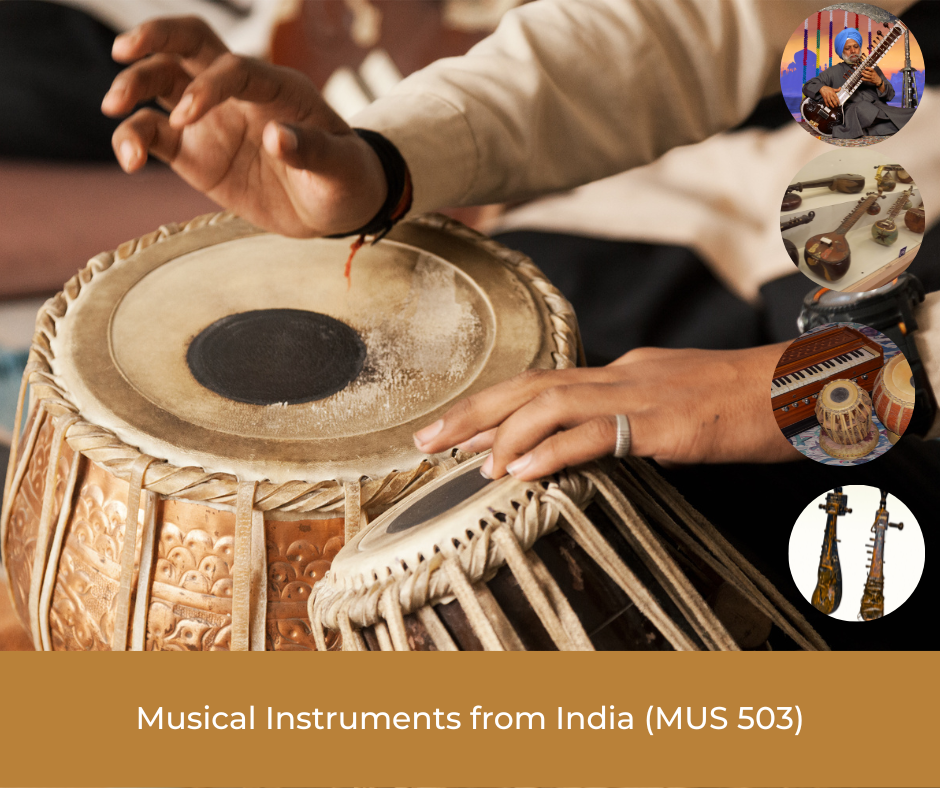Your cart is currently empty!
Musical Instruments from India (MUS 503)

Course Description – Musical Instruments from India (MUS 503):
MUS 503 is a specialized course that offers an immersive exploration of the diverse and culturally rich tradition of musical instruments from India. Through a combination of historical insights, craftsmanship studies, and practical sessions, students will gain a comprehensive understanding of iconic Indian musical instruments. This course provides a unique opportunity to appreciate the artistry, history, and playing techniques associated with instruments like the rabab, sitar, tabla, veena, and more.
Outline of Major Content Areas:
- Introduction to Indian Musical Instruments:
- Overview of the significance and diversity of Indian musical instruments.
- Exploration of the cultural and historical contexts in which these instruments developed.
- Historical Evolution:
- Study of the historical evolution of key Indian musical instruments.
- Examination of instruments’ roles in classical and folk traditions.
- Craftsmanship and Artistry:
- Detailed exploration of the craftsmanship involved in creating Indian musical instruments.
- Insights into the artistry, materials, and techniques used in their construction.
- Playing Techniques:
- Practical sessions and demonstrations on playing techniques for select instruments.
- Hands-on experience in producing music with instruments such as the rabab, sitar, tabla, veena, and others.
- Notation and Musical Forms:
- Introduction to notation systems and musical forms associated with Indian classical music.
- Understanding how various instruments contribute to classical compositions.
- Instrumental Music Traditions:
- Exploration of regional instrumental music traditions and their unique instruments.
- Comparative analysis of instruments across different Indian musical styles.
Course Learning Outcomes:
Upon successful completion of MUS 503, students will be able to:
- Comprehensive Knowledge: Demonstrate a comprehensive understanding of Indian musical instruments, their history, and cultural significance.
- Craftsmanship Appreciation: Appreciate the craftsmanship and artistry involved in the creation of Indian musical instruments.
- Playing Proficiency: Develop basic playing skills for select Indian musical instruments through practical sessions.
- Cultural Context: Understand the cultural and historical contexts in which these instruments have evolved.
- Notation and Musical Forms: Interpret basic notation and identify common musical forms in Indian classical music.
- Regional Insights: Gain insights into regional instrumental music traditions and the role of instruments within them.
Methods for Assessing Student Learning:
To assess students’ progress and development in MUS 503, a variety of assessment methods will be employed, including:
- Instrumental Proficiency Assessment: Evaluation of students’ practical skills in playing select Indian musical instruments.
- Research Projects: Research papers or presentations on the history and cultural significance of specific instruments.
- Oral Examinations: Assessments testing students’ knowledge of instrument history, craftsmanship, and cultural contexts.
- Performance Demonstrations: Students may be required to demonstrate their ability to play and explain the characteristics of specific instruments.
- Class Participation: Active engagement in discussions, practical sessions, and instrument demonstrations.
- Written Assignments: Assignments may include essays or reports on topics related to Indian musical instruments.
These assessment methods will not only measure students’ academic knowledge but also their practical skills and appreciation for the rich tradition of Indian musical instruments.